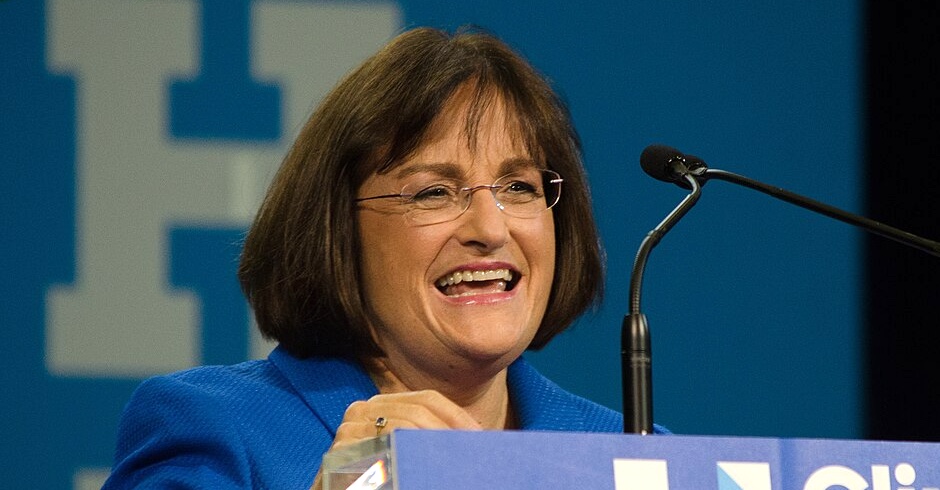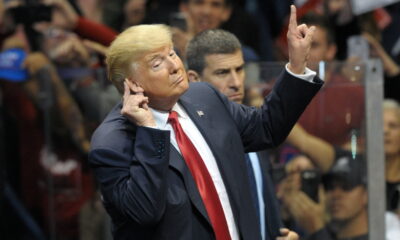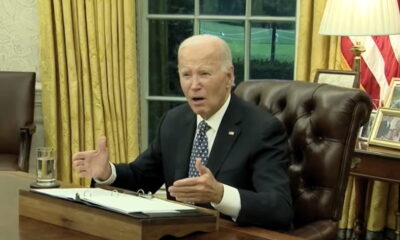READ: President Trump’s Announcement Exiting Paris Climate Agreement
STATEMENT BY PRESIDENT TRUMPÂ ON THE PARIS CLIMATE ACCORD
Thursday afternoon at about 3:30 PM President Donald Trump announced his decision to remove the United States from the Paris Agreement, a historic and vital 195 nation accord to reduce dangerous greenhouse gases. Below are his remarks, as provided by the White House. They end with EPA Administrator Scott Pruitt’s remarks.
(Note: President Trump began his remarks discussing “the terrorist attack in Manila.” There was no terrorist attack in Manila. According to local law enforcement officials in the Philippines, it was a lone gunman committing a robbery.)
RELATED:
BREAKING: Donald Trump Pulls US Out of Historic Paris Climate Agreement
Mayor of Pittsburgh Totally Trolls Trump: ‘We Will Follow Guidelines of the Paris Agreement’
France, Germany, Italy Join to Reject Trump Offer to Renegotiate Paris Climate Agreement
THE WHITE HOUSE
Office of the Press Secretary
For Immediate Release June 1, 2017
STATEMENT BY PRESIDENT TRUMP
ON THE PARIS CLIMATE ACCORD
Rose Garden
3:32 P.M. EDT
THE PRESIDENT: Thank you very much. (Applause.) Thank you. I would like to begin by addressing the terrorist attack in Manila. We’re closely monitoring the situation, and I will continue to give updates if anything happens during this period of time. But it is really very sad as to what’s going on throughout the world with terror. Our thoughts and our prayers are with all of those affected.
Before we discuss the Paris Accord, I’d like to begin with an update on our tremendous — absolutely tremendous — economic progress since Election Day on November 8th. The economy is starting to come back, and very, very rapidly. We’ve added $3.3 trillion in stock market value to our economy, and more than a million private sector jobs.
I have just returned from a trip overseas where we concluded nearly $350 billion of military and economic development for the United States, creating hundreds of thousands of jobs. It was a very, very successful trip, believe me. (Applause.) Thank you. Thank you.
In my meetings at the G7, we have taken historic steps to demand fair and reciprocal trade that gives Americans a level playing field against other nations. We’re also working very hard for peace in the Middle East, and perhaps even peace between the Israelis and the Palestinians. Our attacks on terrorism are greatly stepped up — and you see that, you see it all over — from the previous administration, including getting many other countries to make major contributions to the fight against terror. Big, big contributions are being made by countries that weren’t doing so much in the form of contribution.
One by one, we are keeping the promises I made to the American people during my campaign for President –- whether it’s cutting job-killing regulations; appointing and confirming a tremendous Supreme Court justice; putting in place tough new ethics rules; achieving a record reduction in illegal immigration on our southern border; or bringing jobs, plants, and factories back into the United States at numbers which no one until this point thought even possible. And believe me, we’ve just begun. The fruits of our labor will be seen very shortly even more so.
On these issues and so many more, we’re following through on our commitments. And I don’t want anything to get in our way. I am fighting every day for the great people of this country. Therefore, in order to fulfill my solemn duty to protect America and its citizens, the United States will withdraw from the Paris Climate Accord — (applause) — thank you, thank you — but begin negotiations to reenter either the Paris Accord or a really entirely new transaction on terms that are fair to the United States, its businesses, its workers, its people, its taxpayers. So we’re getting out. But we will start to negotiate, and we will see if we can make a deal that’s fair. And if we can, that’s great. And if we can’t, that’s fine. (Applause.)
As President, I can put no other consideration before the wellbeing of American citizens. The Paris Climate Accord is simply the latest example of Washington entering into an agreement that disadvantages the United States to the exclusive benefit of other countries, leaving American workers — who I love — and taxpayers to absorb the cost in terms of lost jobs, lower wages, shuttered factories, and vastly diminished economic production.
Thus, as of today, the United States will cease all implementation of the non-binding Paris Accord and the draconian financial and economic burdens the agreement imposes on our country. This includes ending the implementation of the nationally determined contribution and, very importantly, the Green Climate Fund which is costing the United States a vast fortune.
Compliance with the terms of the Paris Accord and the onerous energy restrictions it has placed on the United States could cost America as much as 2.7 million lost jobs by 2025 according to the National Economic Research Associates. This includes 440,000 fewer manufacturing jobs — not what we need — believe me, this is not what we need — including automobile jobs, and the further decimation of vital American industries on which countless communities rely. They rely for so much, and we would be giving them so little.
According to this same study, by 2040, compliance with the commitments put into place by the previous administration would cut production for the following sectors: paper down 12 percent; cement down 23 percent; iron and steel down 38 percent; coal — and I happen to love the coal miners — down 86 percent; natural gas down 31 percent. The cost to the economy at this time would be close to $3 trillion in lost GDP and 6.5 million industrial jobs, while households would have $7,000 less income and, in many cases, much worse than that.
Not only does this deal subject our citizens to harsh economic restrictions, it fails to live up to our environmental ideals. As someone who cares deeply about the environment, which I do, I cannot in good conscience support a deal that punishes the United States — which is what it does -– the world’s leader in environmental protection, while imposing no meaningful obligations on the world’s leading polluters.
For example, under the agreement, China will be able to increase these emissions by a staggering number of years — 13. They can do whatever they want for 13 years. Not us. India makes its participation contingent on receiving billions and billions and billions of dollars in foreign aid from developed countries. There are many other examples. But the bottom line is that the Paris Accord is very unfair, at the highest level, to the United States.
Further, while the current agreement effectively blocks the development of clean coal in America — which it does, and the mines are starting to open up. We’re having a big opening in two weeks. Pennsylvania, Ohio, West Virginia, so many places. A big opening of a brand-new mine. It’s unheard of. For many, many years, that hasn’t happened. They asked me if I’d go. I’m going to try.
China will be allowed to build hundreds of additional coal plants. So we can’t build the plants, but they can, according to this agreement. India will be allowed to double its coal production by 2020. Think of it: India can double their coal production. We’re supposed to get rid of ours. Even Europe is allowed to continue construction of coal plants.
In short, the agreement doesn’t eliminate coal jobs, it just transfers those jobs out of America and the United States, and ships them to foreign countries.
This agreement is less about the climate and more about other countries gaining a financial advantage over the United States. The rest of the world applauded when we signed the Paris Agreement — they went wild; they were so happy — for the simple reason that it put our country, the United States of America, which we all love, at a very, very big economic disadvantage. A cynic would say the obvious reason for economic competitors and their wish to see us remain in the agreement is so that we continue to suffer this self-inflicted major economic wound. We would find it very hard to compete with other countries from other parts of the world.
We have among the most abundant energy reserves on the planet, sufficient to lift millions of America’s poorest workers out of poverty. Yet, under this agreement, we are effectively putting these reserves under lock and key, taking away the great wealth of our nation — it’s great wealth, it’s phenomenal wealth; not so long ago, we had no idea we had such wealth — and leaving millions and millions of families trapped in poverty and joblessness.
The agreement is a massive redistribution of United States wealth to other countries. At 1 percent growth, renewable sources of energy can meet some of our domestic demand, but at 3 or 4 percent growth, which I expect, we need all forms of available American energy, or our country — (applause) — will be at grave risk of brownouts and blackouts, our businesses will come to a halt in many cases, and the American family will suffer the consequences in the form of lost jobs and a very diminished quality of life.
Even if the Paris Agreement were implemented in full, with total compliance from all nations, it is estimated it would only produce a two-tenths of one degree — think of that; this much — Celsius reduction in global temperature by the year 2100. Tiny, tiny amount. In fact, 14 days of carbon emissions from China alone would wipe out the gains from America — and this is an incredible statistic — would totally wipe out the gains from America’s expected reductions in the year 2030, after we have had to spend billions and billions of dollars, lost jobs, closed factories, and suffered much higher energy costs for our businesses and for our homes.
As the Wall Street Journal wrote this morning: “The reality is that withdrawing is in America’s economic interest and won’t matter much to the climate.†The United States, under the Trump administration, will continue to be the cleanest and most environmentally friendly country on Earth. We’ll be the cleanest. We’re going to have the cleanest air. We’re going to have the cleanest water. We will be environmentally friendly, but we’re not going to put our businesses out of work and we’re not going to lose our jobs. We’re going to grow; we’re going to grow rapidly. (Applause.)
And I think you just read — it just came out minutes ago, the small business report — small businesses as of just now are booming, hiring people. One of the best reports they’ve seen in many years.
I’m willing to immediately work with Democratic leaders to either negotiate our way back into Paris, under the terms that are fair to the United States and its workers, or to negotiate a new deal that protects our country and its taxpayers. (Applause.)
So if the obstructionists want to get together with me, let’s make them non-obstructionists. We will all sit down, and we will get back into the deal. And we’ll make it good, and we won’t be closing up our factories, and we won’t be losing our jobs. And we’ll sit down with the Democrats and all of the people that represent either the Paris Accord or something that we can do that’s much better than the Paris Accord. And I think the people of our country will be thrilled, and I think then the people of the world will be thrilled. But until we do that, we’re out of the agreement.
I will work to ensure that America remains the world’s leader on environmental issues, but under a framework that is fair and where the burdens and responsibilities are equally shared among the many nations all around the world.
No responsible leader can put the workers — and the people — of their country at this debilitating and tremendous disadvantage. The fact that the Paris deal hamstrings the United States, while empowering some of the world’s top polluting countries, should dispel any doubt as to the real reason why foreign lobbyists wish to keep our magnificent country tied up and bound down by this agreement: It’s to give their country an economic edge over the United States. That’s not going to happen while I’m President. I’m sorry. (Applause.)
My job as President is to do everything within my power to give America a level playing field and to create the economic, regulatory and tax structures that make America the most prosperous and productive country on Earth, and with the highest standard of living and the highest standard of environmental protection.
Our tax bill is moving along in Congress, and I believe it’s doing very well. I think a lot of people will be very pleasantly surprised. The Republicans are working very, very hard. We’d love to have support from the Democrats, but we may have to go it alone. But it’s going very well.
The Paris Agreement handicaps the United States economy in order to win praise from the very foreign capitals and global activists that have long sought to gain wealth at our country’s expense. They don’t put America first. I do, and I always will. (Applause.)
The same nations asking us to stay in the agreement are the countries that have collectively cost America trillions of dollars through tough trade practices and, in many cases, lax contributions to our critical military alliance. You see what’s happening. It’s pretty obvious to those that want to keep an open mind.
At what point does America get demeaned? At what point do they start laughing at us as a country? We want fair treatment for its citizens, and we want fair treatment for our taxpayers. We don’t want other leaders and other countries laughing at us anymore. And they won’t be. They won’t be.
I was elected to represent the citizens of Pittsburgh, not Paris. (Applause.) I promised I would exit or renegotiate any deal which fails to serve America’s interests. Many trade deals will soon be under renegotiation. Very rarely do we have a deal that works for this country, but they’ll soon be under renegotiation. The process has begun from day one. But now we’re down to business.
Beyond the severe energy restrictions inflicted by the Paris Accord, it includes yet another scheme to redistribute wealth out of the United States through the so-called Green Climate Fund — nice name — which calls for developed countries to send $100 billion to developing countries all on top of America’s existing and massive foreign aid payments. So we’re going to be paying billions and billions and billions of dollars, and we’re already way ahead of anybody else. Many of the other countries haven’t spent anything, and many of them will never pay one dime.
The Green Fund would likely obligate the United States to commit potentially tens of billions of dollars of which the United States has already handed over $1 billion — nobody else is even close; most of them haven’t even paid anything — including funds raided out of America’s budget for the war against terrorism. That’s where they came. Believe me, they didn’t come from me. They came just before I came into office. Not good. And not good the way they took the money.
In 2015, the United Nation’s departing top climate officials reportedly described the $100 billion per year as “peanuts,†and stated that “the $100 billion is the tail that wags the dog.” In 2015, the Green Climate Fund’s executive director reportedly stated that estimated funding needed would increase to $450 billion per year after 2020. And nobody even knows where the money is going to. Nobody has been able to say, where is it going to?
Of course, the world’s top polluters have no affirmative obligations under the Green Fund, which we terminated. America is $20 trillion in debt. Cash-strapped cities cannot hire enough police officers or fix vital infrastructure. Millions of our citizens are out of work. And yet, under the Paris Accord, billions of dollars that ought to be invested right here in America will be sent to the very countries that have taken our factories and our jobs away from us. So think of that.
There are serious legal and constitutional issues as well. Foreign leaders in Europe, Asia, and across the world should not have more to say with respect to the U.S. economy than our own citizens and their elected representatives. Thus, our withdrawal from the agreement represents a reassertion of America’s sovereignty. (Applause.) Our Constitution is unique among all the nations of the world, and it is my highest obligation and greatest honor to protect it. And I will.
Staying in the agreement could also pose serious obstacles for the United States as we begin the process of unlocking the restrictions on America’s abundant energy reserves, which we have started very strongly. It would once have been unthinkable that an international agreement could prevent the United States from conducting its own domestic economic affairs, but this is the new reality we face if we do not leave the agreement or if we do not negotiate a far better deal.
The risks grow as historically these agreements only tend to become more and more ambitious over time. In other words, the Paris framework is a starting point — as bad as it is — not an end point. And exiting the agreement protects the United States from future intrusions on the United States’ sovereignty and massive future legal liability. Believe me, we have massive legal liability if we stay in.
As President, I have one obligation, and that obligation is to the American people. The Paris Accord would undermine our economy, hamstring our workers, weaken our sovereignty, impose unacceptable legal risks, and put us at a permanent disadvantage to the other countries of the world. It is time to exit the Paris Accord — (applause) — and time to pursue a new deal that protects the environment, our companies, our citizens, and our country.
It is time to put Youngstown, Ohio, Detroit, Michigan, and Pittsburgh, Pennsylvania — along with many, many other locations within our great country — before Paris, France. It is time to make America great again. (Applause.) Thank you. Thank you. Thank you very much.
Thank you very much. Very important. I’d like to ask Scott Pruitt, who most of you know and respect, as I do, just to say a few words.
Scott, please. (Applause.)
ADMINISTRATOR PRUITT: Thank you, Mr. President. Your decision today to exit the Paris Accord reflects your unflinching commitment to put America first.
And by exiting, you’re fulfilling yet one more campaign promise to the American people. Please know that I am thankful for your fortitude, your courage, and your steadfastness as you serve and lead our country.
America finally has a leader who answers only to the people — not to the special interests who have had their way for way too long. In everything you do, Mr. President, you’re fighting for the forgotten men and women across this country. You’re a champion for the hardworking citizens all across this land who just want a government that listens to them and represents their interest.
You have promised to put America First in all that you do, and you’ve done that in any number of ways — from trade, to national security, to protecting our border, to rightsizing Washington, D.C. And today you’ve put America first with regard to international agreements and the environment.
This is an historic restoration of American economic independence — one that will benefit the working class, the working poor, and working people of all stripes. With this action, you have declared that the people are rulers of this country once again. And it should be noted that we as a nation do it better than anyone in the world in striking the balance between growing our economy, growing jobs while also being a good steward of our environment.
We owe no apologies to other nations for our environmental stewardship. After all, before the Paris Accord was ever signed, America had reduced its CO2 footprint to levels from the early 1990s. In fact, between the years 2000 and 2014, the United States reduced its carbon emissions by 18-plus percent. And this was accomplished not through government mandate, but accomplished through innovation and technology of the American private sector.
For that reason, Mr. President, you have corrected a view that was paramount in Paris that somehow the United States should penalize its own economy, be apologetic, lead with our chin, while the rest of world does little. Other nations talk a good game; we lead with action — not words. (Applause.)
Our efforts, Mr. President, as you know, should be on exporting our technology, our innovation to nations who seek to reduce their CO2 footprint to learn from us. That should be our focus versus agreeing to unachievable targets that harm our economy and the American people.
Mr. President, it takes courage, it takes commitment to say no to the plaudits of men while doing what’s right by the American people. You have that courage, and the American people can take comfort because you have their backs.
Thank you, Mr. President.
END 4:03 P.M. EDT
To comment on this article and other NCRM content, visit our Facebook page.Â

Enjoy this piece?
… then let us make a small request. The New Civil Rights Movement depends on readers like you to meet our ongoing expenses and continue producing quality progressive journalism. Three Silicon Valley giants consume 70 percent of all online advertising dollars, so we need your help to continue doing what we do.
NCRM is independent. You won’t find mainstream media bias here. From unflinching coverage of religious extremism, to spotlighting efforts to roll back our rights, NCRM continues to speak truth to power. America needs independent voices like NCRM to be sure no one is forgotten.
Every reader contribution, whatever the amount, makes a tremendous difference. Help ensure NCRM remains independent long into the future. Support progressive journalism with a one-time contribution to NCRM, or click here to become a subscriber. Thank you. Click here to donate by check.
 |























